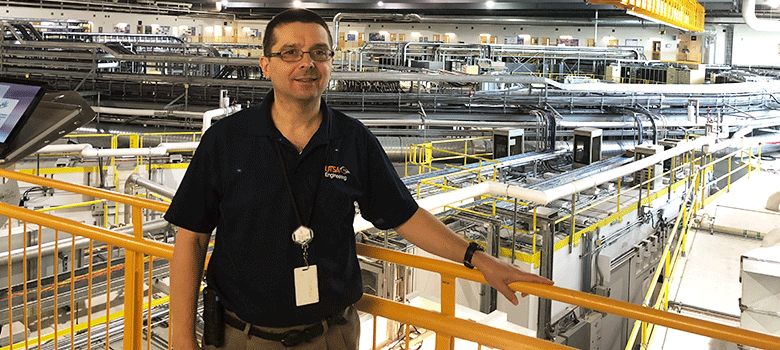
AUGUST 12, 2021 — The University of Texas at San Antonio and Southwest Research Institute (SwRI) are collaborating to combine two catalytic processes into a single reactor, with the overall goal of recycling carbon from CO2 to produce low-cost hydrocarbon fuels.
The work, led by Grant Seuser of SwRI’s Powertrain Engineering Division and Gary Jacobs of UTSA’s College of Engineering and Integrated Design, is supported by a $125,000 grant from the Connecting through Research Partnerships (Connect) Program.
Greenhouse gas emissions are expected to increase by about 17% by 2040 as a result of increasing energy and transportation needs in the developing world.

UTSA chemical engineering professor Gary Jacobs is collaboarting with SwRI's Grant Seuser on research with an ultimate goal of recycling carbon from CO2 to produce low-cost hydrocarbon fuels.
“We’re facing a lack of renewable fuels and the technology to deliver cleaner power generation,” Seuser said. “We’re seeing a rise in battery-powered passenger vehicles, but the high-power demands of the aviation, locomotive, shipping, and long-haul trucking industries will continue to require energy-dense hydrocarbons for the foreseeable future.”
Seuser and Jacobs propose using a process called carbon dioxide (CO2) hydrogenation to produce cleaner renewable liquid hydrocarbon fuels for transportation. To accomplish this, they plan to build a single reactor capable of performing two chemical processes in one step. The first will react hydrogen with CO2 to make carbon monoxide (CO) and the second will convert the CO and hydrogen, a blend known as synthesis gas or syngas, into liquid hydrocarbon fuel by a catalytic process known as Fischer-Tropsch synthesis.
“Fischer-Tropsch synthesis was discovered in Germany about a century ago and is still used in places like South Africa and Qatar to convert coal and natural gas into liquid hydrocarbon fuels,” Jacobs explained. “Plant capacities (are) ranging from tens of thousands to hundreds of thousands of barrels of fuel per day. It will be an interesting challenge to integrate this catalytic technology into a process that uses CO2 in the feed.”
Additionally, the process the SwRI-UTSA team is developing will be able to utilize CO2 captured at fossil fuel-fired power plants that would otherwise be sequestered underground or emitted into the atmosphere.
“Combining the functionality of these two catalytic processes, reverse water-gas shift and Fischer-Tropsch synthesis, into a single reactor would simplify the process and increase its economic viability,” Jacobs said.
The effort will also explore novel catalyst formations aimed at combining reverse water-gas shift and Fischer Tropsch synthesis functions, which Jacobs will create and characterize at UTSA. Seuser will use the catalysts in a SwRI reactor to assess their industrial viability.
“Reducing the complexity of converting CO2 into hydrocarbon fuels would have a big impact,” Seuser said. “Finding a way to produce low-carbon fuels and maintain our current energy infrastructure is critical to avoid further increases in Earth’s temperature.”
SwRI’s Executive Office and UTSA’s Office of the Vice President for Research, Economic Development, and Knowledge Enterprise sponsor the Connect program, which offers grant opportunities to enhance greater scientific collaboration between the two institutions.
UTSA Today is produced by University Communications and Marketing, the official news source of The University of Texas at San Antonio. Send your feedback to news@utsa.edu. Keep up-to-date on UTSA news by visiting UTSA Today. Connect with UTSA online at Facebook, Twitter, Youtube and Instagram.
Move In To COLFA is strongly recommended for new students in COLFA. It gives you the chance to learn about the Student Success Center, campus resources and meet new friends!
Academic Classroom: Lecture Hall (MH 2.01.10,) McKinney Humanities BldgWe invite you to join us for Birds Up! Downtown, an exciting welcome back event designed to connect students with the different departments at the Downtown Campus. Students will have the opportunity to learn about some of the departments on campus, gain access to different resources, and collect some giveaways!
Bill Miller PlazaCome and celebrate this year's homecoming at the Downtown Campus with food, games, giveaways, music, and more. We look forward to seeing your Roadrunner Spirit!
Bill Miller PlazaThe University of Texas at San Antonio is dedicated to the advancement of knowledge through research and discovery, teaching and learning, community engagement and public service. As an institution of access and excellence, UTSA embraces multicultural traditions and serves as a center for intellectual and creative resources as well as a catalyst for socioeconomic development and the commercialization of intellectual property - for Texas, the nation and the world.
To be a premier public research university, providing access to educational excellence and preparing citizen leaders for the global environment.
We encourage an environment of dialogue and discovery, where integrity, excellence, respect, collaboration and innovation are fostered.